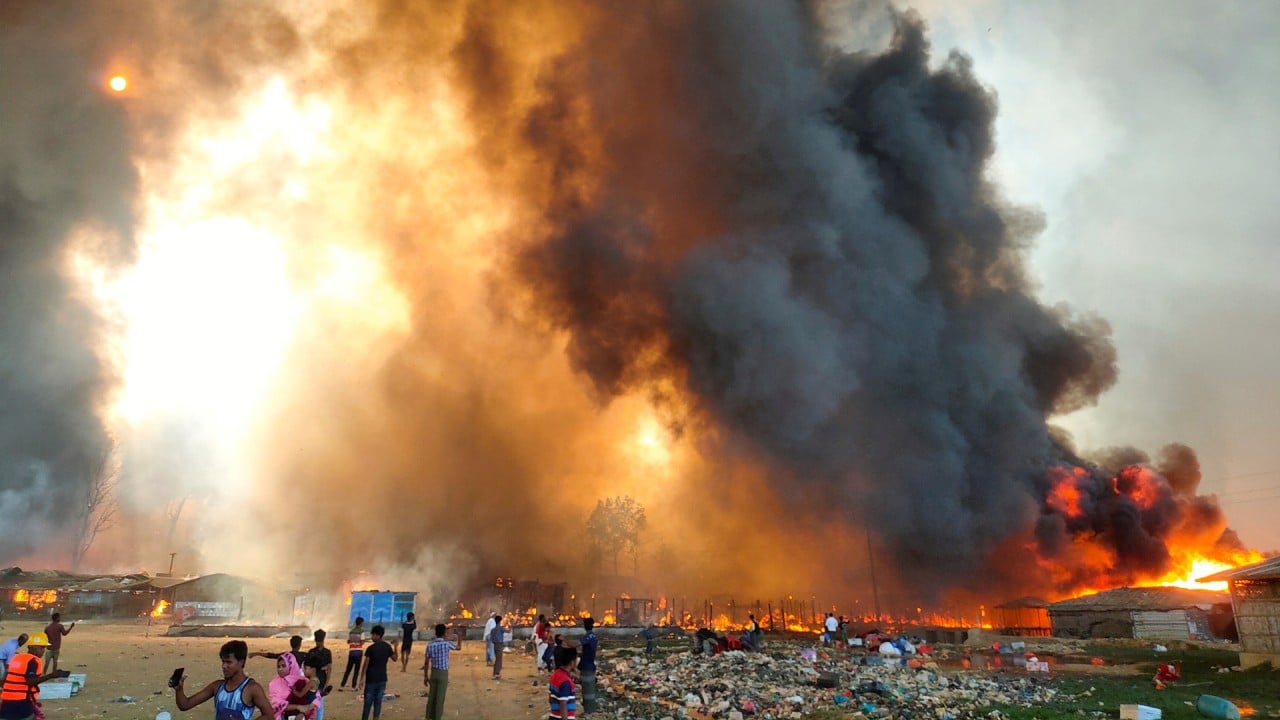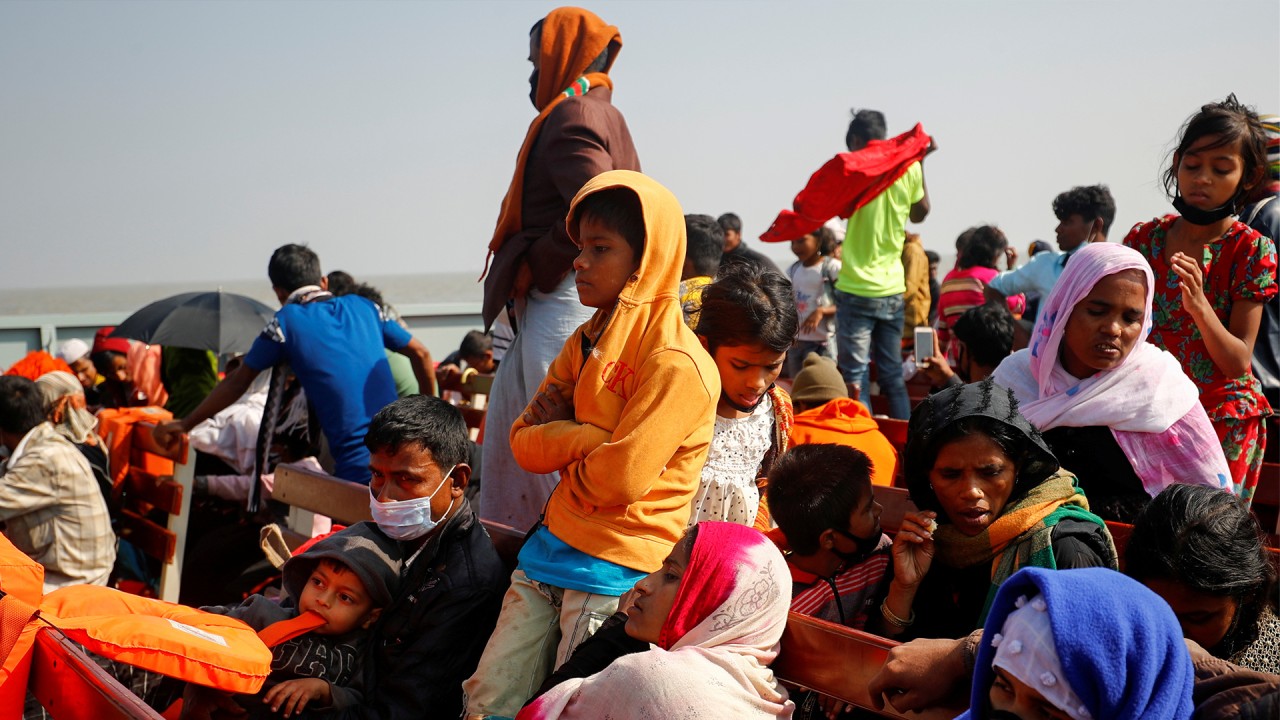
Bleak Ramadan for Myanmar’s Rohingya Muslims, in danger of further abuses by the military, analysts warn
- The persecuted community are at risk of ‘genocidal actions’ as the junta takes on ethnic armed groups
- Meanwhile, Rohingya in Bangladeshi refugee camps are living in fear of fires and facing an uncertain future
Ronan Lee, a visiting scholar with the International State Crime Initiative – a community working to expose, document and resist state crime – said around 140,000 Rohingyas had been confined to concentration camps within the country’s western Rakhine state, where they have been forced to live since 2012.
Ramadan 2021: Muslims worldwide navigate restrictions in second year of pandemic
“The circumstances for Rohingya living in Myanmar continue to be grim,” said Lee, who is also the author of Myanmar’s Rohingya Genocide: Identity, History and Hate Speech.
He said those outside the camps had to “endure an apartheid system” with tight restrictions on their ability to travel even to adjacent villages, and had limited access to education, health care and work opportunities.
Described by the UN as Myanmar’s most persecuted ethnic group, the Rohingya people have faced discrimination and repression since the country’s independence in 1948.
While the country’s majority ethnically Bamar population have become more sympathetic to the plight of the Rohingya since the February 1 coup – with one of the leaders of a group of civilian rivals to the junta last month promising to delivery justice for the minority group – there appears to be little they can do to protect the Rohingya from the military.
Noting that the Rohingya’s situation had always been made worse when the junta acquired more power, Lee said the people were “very vulnerable to further abuses by the military”.
Recounting the atrocities faced by Rohingya civilians in 2017 – including murders, arrests, and sexual violence – he said they were unable to protect themselves from the well-armed soldiers.
How will Covid-19 and the coup affect China’s Myanmar investments?
“The situation is the same today,” Lee said, adding that internet blackouts and the widespread arrests of journalists had made it more difficult to bring the plight faced by the Rohingya people to light.
“[Min Aung Hlaing] once said that the Rohingya crisis is unfinished business from World War II,” he said.
During that conflict, Rohingya Muslims – who were allied with the British and were promised a Muslim state in return – fought against Rakhine Buddhists who had joined the side of the Japanese. After independence, the newly formed government of the predominantly Buddhist country denied citizenship to the Rohingyas, subjecting them to extensive, systematic discrimination in Myanmar.

Nay San Lwin added that even though the Rohingya in Rakhine state wished to join the countrywide protests against the coup, there was little chance for them to do so as many were confined in camps and villages.
“The Rohingya have been unprotected and will be unprotected if there are any fights between the Arakan Army and the Myanmar military,” he said.
A major player among Myanmar’s more than two dozen ethnic armed groups, the Arakan Army had previously fought for greater autonomy in Rakhine state. Last month, however, it announced its readiness to join forces with all other ethnic groups in fighting against the junta if the brutal killing of anti-coup protesters continued.
Rohingya refugees in Bangladesh camps fear returning to Myanmar after coup
However, he warned that this could change at any moment. “If any of the ethnic armed groups in Rakhine engaged in conflict with the army, it could easily turn into a situation where the military used it as an excuse to kill and massively displace the remaining Rohingya.”
The junta has in recent days conducted air strikes in Kachin state, near the Chinese border, in response to forces from the Karen National Liberation Army armed ethnic group overrunning a military outpost on March 27.
Meanwhile, Rohingya refugees in the Cox’s Bazar camps in Bangladesh are said to be fearing for their lives after seven more fires broke out since Sunday, taking the total number of blazes to 84 in just four months, according to ReliefWeb, a humanitarian information service provided by the United Nations Office for the Coordination of Humanitarian Affairs.
Describing the situation faced by the refugees as dire, Kyaw Win said the large fires in recent weeks had displaced thousands. “The majority of Rohingya feel trapped in the camps with no prospects for their future and no way to live a normal life,” he said.
Despite criticism from rights groups, the Bangladeshi government has since December moved more than 18,500 Rohingya from the overcrowded refugee camps of Cox’s Bazar to Bhasan Char island in the Bay of Bengal, which is said to be vulnerable to severe weather.
Nay San Lwin of The Free Rohingya Coalition said the refugees had little choice but to be taken to the remote island. “Bangladesh will take more refugees to this flood-prone island,” he said.
Despite concerns over the risks of tidal surges and cyclones on Bhasan Char, Dhaka has said conditions on the island – which is equipped with cyclone shelters; flood-protection embankments; facilities for education, farming and fishing; as well as hospitals and playgrounds – are much better than the camps in Cox’s Bazar.
Death threats, hate speech trap Rohingya man in Malaysia home for a year
The International State Crime Initiative’s Lee said Bangladesh had too readily securitised the refugee camps, surrounding them with barbed wire and frequently blocking internet access.
This, he said, was a counterproductive approach that cost lives when fires destroyed the flimsy accommodation available to the Rohingya residents, adding that the UN and Bangladesh had to cooperate to recognise the Rohingya as victims of crimes and give the refugees the assistance they needed to build dignified lives.
“Important steps must involve the UN and Bangladesh prioritising Rohingya voices in decision-making about the refugee community,” he said.
Even though international pressure is mounting on the Myanmar military to restore democracy and repatriate the refugees, Lee said the coup had made their repatriation even less likely.
“The Rohingya’s long-term future will be brighter [only] if the coup can be defeated,” Lee said.



